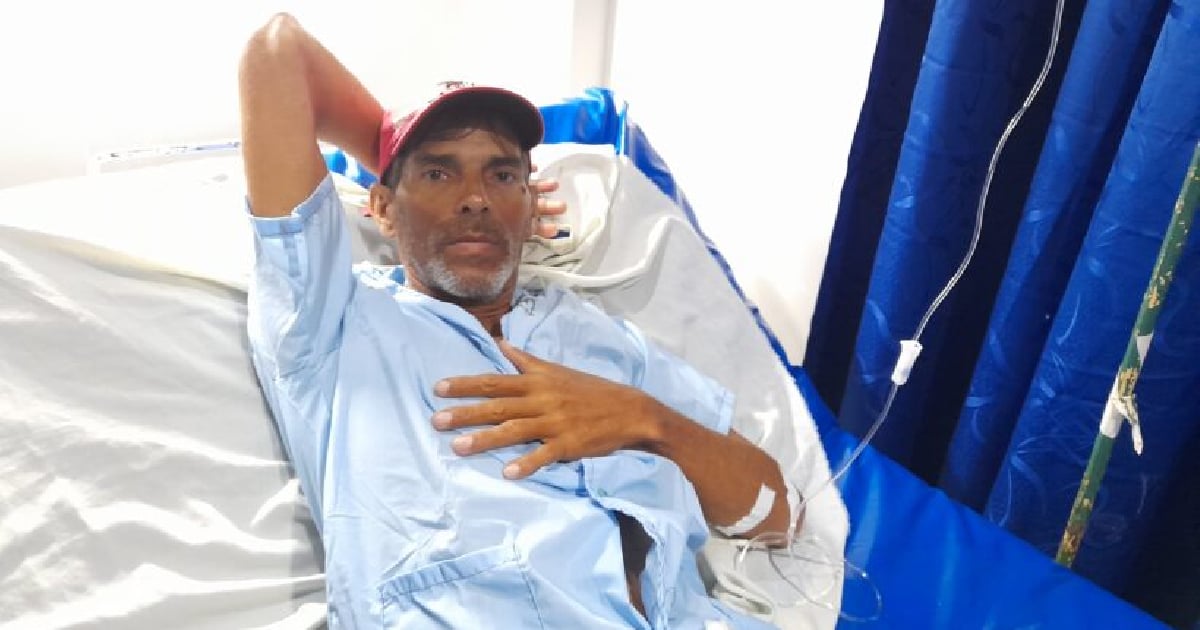"The sea demands respect!" declares Carlos Francisco Rodríguez González, a Cuban fisherman who, along with a young companion of just 15 years, endured a week adrift at sea, surviving to share their harrowing experience. Rodríguez, aged 55, hailing from Cerro, Havana, and working in the culinary field, alongside teenager Yusuan Fundora Massaguet, were the central figures in a recent maritime ordeal, rescued by a vessel near the Bahamas.
After being located on January 23, they were transported to Matanzas city for medical care. At the Faustino de Pérez Provincial Hospital, where he was recuperating from his injuries, Rodríguez recounted to journalist Ana Cristina Rodríguez from the Girón newspaper the adventure that nearly cost them their lives.
The Unforeseen Journey Begins
On the evening of January 16, they set out separately for a fishing trip, unaware that they would spend seven days lost at sea, clinging to the hope of rescue. Their desperate families searched diligently and reported their disappearance on social media.
Having taken up fishing just three years prior, Rodríguez had anticipated a quick outing when he departed at midnight on January 16. But "everything got complicated," he recounted.
Fishing in Havana Bay, Rodríguez attempted to navigate toward Playa del Chivo, but his small fins broke. A young boy approached him in another raft, offering help, but the strong wind and current carried them away.
Strangers Become Allies
Rodríguez confessed they had not known each other previously but had crossed paths at Playa del Chivo. "I usually fish with a neighbor from my building, but he was further out that day. The boy was curious because I had caught two large barracudas, and he wanted my help with his catch. When my fins broke, our situation worsened. The last fish I hooked was strong, pulling us further out until it released us."
The current dragged them eastward, with no boats in sight to offer assistance. "The kid lacked experience, and exhaustion overcame us," Rodríguez said.
A Battle Against the Elements
On the following night, Rodríguez's raft split completely, forcing both to share the boy's makeshift boat. "For a week, we drifted, barely eating or drinking," he lamented.
Rodríguez's vessel measured a meter wide by 1.70 meters long, while the boy's was narrower. "On the first night, we capsized while trying to get comfortable," he recalled. "We ended up in a position where we couldn't move: his head here, mine there, practically embracing each other."
Without their usual supplies, they turned to the sea for sustenance. "On the second day, I caught a mahi-mahi with a bare hook. We cut it with a knife and ate it raw. He even drank saltwater," Rodríguez admitted.
Surviving Against the Odds
The sea teemed with sharks, but Rodríguez felt no fear. "Unless there's a bleeding fish, a shark won't attack. I was more afraid of dying from dehydration," he explained.
Each morning, they scanned the horizon for ships. Despite signaling to passing cruise ships, no one responded. Desperation took hold, and the boy contemplated ending his life, but Rodríguez dissuaded him.
Due to the ocean's depth, anchoring was impossible. "I threw a heavy line with a large stone, but it was swallowed by the sea," Rodríguez said. "We hoped to find a fishing structure to hold onto, but we encountered none."
With nothing else but prayers to the Virgin Mary, they drifted until they were discovered near the Bahamas. "The current took us all over. I don't want to remember those nights, the waves crashing over us," Rodríguez described.
The Rescue and Aftermath
On January 23, a nearby ship marked their salvation. "We spotted a light, and the current pushed us toward it. Using our small fins, one guided while the other propelled. We screamed for help until someone noticed us and alerted the captain. In the open sea, that rope they threw saved us."
After their rescue, the boy was hospitalized at the Eliseo Noel Caamaño Pediatric Hospital, while Rodríguez was treated at Faustino Pérez. Rodríguez suffered minor burns from the salt and raft conditions; the Cuban media did not report on the boy's health status. Both were discharged on January 25.
Rodríguez confessed he'd never endured such a scare. "The most dangerous thing before was the current carrying me a bit away, just a few meters from the shore. This was beyond anything I'd experienced."
Despite embracing fishing as a means of sustenance three years ago, this ordeal changed his perspective: "I've told everyone I'm done. But I won't starve; if I must return, I will. It'll take a while, though. The sea deserves respect!"
Questions about the Ordeal at Sea
How did Rodríguez and the teenager survive without food and water?
They resorted to catching and eating a mahi-mahi raw and attempted to drink saltwater, though it was not ideal.
What were the main challenges they faced while adrift?
Rodríguez and the teenager battled exhaustion, dehydration, shark-infested waters, and the lack of visible rescue opportunities.
What did Rodríguez learn from this experience?
Rodríguez realized the importance of respecting the sea and decided to stop fishing, though he acknowledges he might return if necessary.
